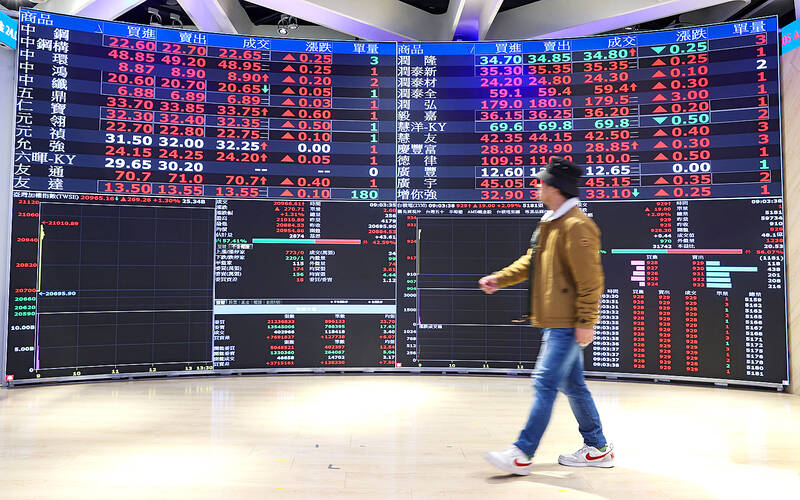The 950 Taiwanese and 88 overseas companies with primary listings on the Taiwan Stock Exchange (TWSE) reported combined pretax profit of NT$4.89 trillion (US$147.3 billion) for last year, up 38.33 percent from NT$3.54 trillion a year earlier, the exchange said yesterday.
The TWSE-listed firms generated NT$41.8 trillion in combined revenue, an increase of 13.32 percent from NT$36.88 trillion, the exchange said in a statement.
The increase in pretax profit came as listed technology companies benefitted from rising demand for cloud data services and high-performance computing amid an artificial intelligence (AI) boom, the exchange said.

Photo: CNA
Last year, 854 TWSE-listed companies posted gains in pretax profit, especially those in the semiconductor, financial services and shipping sectors, the exchange said.
Financial services providers benefited from positive market conditions, which led to an increase in investment gains, handling fees and other incomes last year, the TWSE said.
Firms in the semiconductor sector posted strong bottom lines last year as they were able to leverage advanced technology and diversified supply chain deployment to seize the AI business opportunities, while the Red Sea crisis pushed higher freight fees and contributed to profit increases in the shipping sector, it said.
Listed companies that saw their profit drop last year were mainly those in the plastics, steel, and oil, electricity and gas sectors due to deteriorated market fundamentals, the exchange said.
Firms in the plastics sector suffered from oversupply by their Chinese peers and a decline in investment gains, steel makers were also hit by China’s overcapacity and weak end-market demand worldwide, while falling crude oil prices contributed to profit falls in the oil, electricity and gas sector, it said.
Meanwhile, the combined pretax profit of the 846 companies on the over-the-counter Taipei Exchange (TPEX) rose 15.27 percent to NT$314.5 billion last year, while their combined revenue increased 7.24 percent to NT$2.78 trillion from a year earlier, the smaller exchange said in a separate statement.
The TPEX said that 640 firms posted higher profit than the previous year, led by those in the electronic components, cultural and creative services, and other electronics sectors.
In addition, many over-the-counter companies reported improved fundamentals that deserve investors’ attention, the exchange said, adding that 66 companies’ earnings per share (EPS) exceeded NT$10 and 120 firms’ EPS were between NT$5 and NT$10, while 200 were between NT$2 and NT$5.
Aspeed Technology Inc (信驊), an IC designer specializing in cloud and enterprise solutions with product portfolio including baseboard management controllers, reported EPS of NT$68.04 for last year, the highest among firms listed on the OTC market, as net profit rose to NT$2.6 billion from NT$1 billion and revenue increased to NT$6.5 billion from NT$3.1 billion a year earlier.

‘SWASTICAR’: Tesla CEO Elon Musk’s close association with Donald Trump has prompted opponents to brand him a ‘Nazi’ and resulted in a dramatic drop in sales Demonstrators descended on Tesla Inc dealerships across the US, and in Europe and Canada on Saturday to protest company chief Elon Musk, who has amassed extraordinary power as a top adviser to US President Donald Trump. Waving signs with messages such as “Musk is stealing our money” and “Reclaim our country,” the protests largely took place peacefully following fiery episodes of vandalism on Tesla vehicles, dealerships and other facilities in recent weeks that US officials have denounced as terrorism. Hundreds rallied on Saturday outside the Tesla dealership in Manhattan. Some blasted Musk, the world’s richest man, while others demanded the shuttering of his

TIGHT-LIPPED: UMC said it had no merger plans at the moment, after Nikkei Asia reported that the firm and GlobalFoundries were considering restarting merger talks United Microelectronics Corp (UMC, 聯電), the world’s No. 4 contract chipmaker, yesterday launched a new US$5 billion 12-inch chip factory in Singapore as part of its latest effort to diversify its manufacturing footprint amid growing geopolitical risks. The new factory, adjacent to UMC’s existing Singapore fab in the Pasir Res Wafer Fab Park, is scheduled to enter volume production next year, utilizing mature 22-nanometer and 28-nanometer process technologies, UMC said in a statement. The company plans to invest US$5 billion during the first phase of the new fab, which would have an installed capacity of 30,000 12-inch wafers per month, it said. The

Taiwan’s official purchasing managers’ index (PMI) last month rose 0.2 percentage points to 54.2, in a second consecutive month of expansion, thanks to front-loading demand intended to avoid potential US tariff hikes, the Chung-Hua Institution for Economic Research (CIER, 中華經濟研究院) said yesterday. While short-term demand appeared robust, uncertainties rose due to US President Donald Trump’s unpredictable trade policy, CIER president Lien Hsien-ming (連賢明) told a news conference in Taipei. Taiwan’s economy this year would be characterized by high-level fluctuations and the volatility would be wilder than most expect, Lien said Demand for electronics, particularly semiconductors, continues to benefit from US technology giants’ effort

Minister of Finance Chuang Tsui-yun (莊翠雲) yesterday told lawmakers that she “would not speculate,” but a “response plan” has been prepared in case Taiwan is targeted by US President Donald Trump’s reciprocal tariffs, which are to be announced on Wednesday next week. The Trump administration, including US Secretary of the Treasury Scott Bessent, has said that much of the proposed reciprocal tariffs would focus on the 15 countries that have the highest trade surpluses with the US. Bessent has referred to those countries as the “dirty 15,” but has not named them. Last year, Taiwan’s US$73.9 billion trade surplus with the US